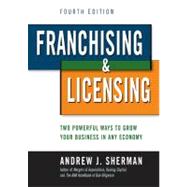
Note: Supplemental materials are not guaranteed with Rental or Used book purchases.
Purchase Benefits
What is included with this book?
| Preface to the Fourth Edition | |
| Acknowledgments | |
| The Foundation for Franchising | |
| Leveraging Intellectual Capital to Create Growth | |
| Opportunities and Profitable New Income Streams | |
| Building a Franchising Program | |
| The Foundation of Franchising | |
| Developing the Operations and Training Programs | |
| Developing System Standards and Enforcing Quality Control | |
| The Regulation of Franchising | |
| Compliance | |
| Structuring Franchise Agreements, Area Development | |
| Agreements, and Related Documents | |
| Protecting the Intellectual Property of the Franchise System | |
| Managing Disputes | |
| Developing Sales and Marketing Strategies at the Target | |
| Franchisee and Target Consumer Levels | |
| Taking Your Franchise Program Overseas | |
| Financial Strategies | |
| Business and Strategic Planning for the Growing Franchisor | |
| Capital Formation Strategies | |
| Management and Leadership Issues in Building a Successful | |
| Franchising Organization | |
| The Role of the Chief Financial Officer and Related Financial and Administrative Management Issues | |
| Special Issues in Mergers and Acquisitions | |
| Managing the Transfer and Renewal Process | |
| Strategic and Structural Alternatives to Franchising | |
| Structuring Licensing Programs and Agreements | |
| Joint Ventures and Strategic Alliances | |
| Resource Directory | |
| Index | |
| Table of Contents provided by Publisher. All Rights Reserved. |
The New copy of this book will include any supplemental materials advertised. Please check the title of the book to determine if it should include any access cards, study guides, lab manuals, CDs, etc.
The Used, Rental and eBook copies of this book are not guaranteed to include any supplemental materials. Typically, only the book itself is included. This is true even if the title states it includes any access cards, study guides, lab manuals, CDs, etc.